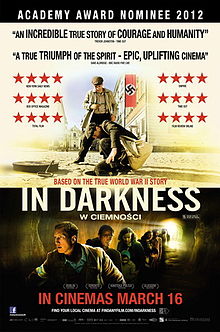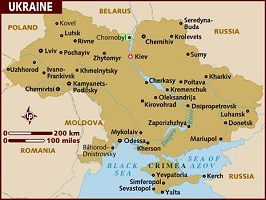 This movie is based on a true story about Socha, a sewage worker in former Poland city Lviv, who hid Jews under the city in 1943 when it was ruled by Nazi Germany. Socha hid Jews in the underground sewer system to escape Nazi persecution. He helps these Jews and agrees to bring them food every day, but Socha’s actions endanger not only his own life, but the lives of his family.
This movie is based on a true story about Socha, a sewage worker in former Poland city Lviv, who hid Jews under the city in 1943 when it was ruled by Nazi Germany. Socha hid Jews in the underground sewer system to escape Nazi persecution. He helps these Jews and agrees to bring them food every day, but Socha’s actions endanger not only his own life, but the lives of his family.
As part of the drama of this movie, Socha is shown as a small criminal who steals and he starts sheltering Jews for money, to which he gets opposition from his wife for helping Jews. But over time, Socha gradually gains sympathy for the Jews he is hiding and he continues to help them free of charge after they run out of money, risking his own life to help them. However, I had a feeling that it may not be entirely accurate as I examined various facts in this movie. It is possible he was sympathetic to the Jews from the beginning and worked together with his wife and friend because of his own desire to help them. As for accepting money, Socha lived a very poor life and probably did not have extra money to buy food for other people so he may have needed the money from the Jews in order to buy them food. Later, when the Jews had used up all of their money, he used his own money to buy food to offer them. The hiding lasted for 14 months.
I don’t know which one is reality, but that is not so important. The important thing is why Socha decided to help the Jews even when it put his own life and the lives of his family in danger. This is what I wish to consider.
Socha lived in the city of Lviv in the east end of Poland, an area from ancient times under repeated contention between the Kingdom of Poland from the west and the Duchy of Kiev from the east. Until the 17th century, Lviv was caught in a series of invasions by the Ukraine Cossack or Ottoman Empire, among others, and in 1704, Swedish troops led by Charles XII during the Great Northern War captured Lviv and the town was destroyed.
Lviv was put under the control of the Austrian Empire by the First Partition of Poland in 1772. The Austrian Empire government strongly pushed for a German-ification and German was made the official language. In hatred of this, the Polish people rose up in revolt in 1848; after that, the people of Poland gradually gained self-governance of this land. Lviv was the center of Polish culture; at the same time, many Ukrainians also lived there and their culture was protected in Lviv, while other Ukrainian districts changed under Russian rule. When the Austro-Hungarian Empire collapsed after Austria’s defeat in World War I in 1918, the West Ukrainian People’s Republic declared its independence with Lviv as its capital.
 Faced with this, the Polish population rose in revolt and the Polish-Ukrainian War began. The war ended with a landslide victory for Poland due to the complete support by the Polish army to defend their homeland, and Lviv once more came under Polish control. The Directorate of the Ukrainian People’s Republic did not support the Ukrainians in Lviv because the Directorate wanted support from Poland to fight against Russia’s Red Army; in exchange for Poland’s support, Poland was allowed to keep control of Lviv.
Faced with this, the Polish population rose in revolt and the Polish-Ukrainian War began. The war ended with a landslide victory for Poland due to the complete support by the Polish army to defend their homeland, and Lviv once more came under Polish control. The Directorate of the Ukrainian People’s Republic did not support the Ukrainians in Lviv because the Directorate wanted support from Poland to fight against Russia’s Red Army; in exchange for Poland’s support, Poland was allowed to keep control of Lviv.
In 1920, the Soviet Red Army attacked Lviv. Armed citizens repelled the Red Army and Poland made a peace treaty with the Soviet Union, ignoring Ukraine’s wishes. This was a betrayal against the alliance they had with the Ukrainian People’s Republic against the Soviet Army.
Summarizing this complicated state of affairs, there was an antagonism between Polish and Ukrainian people in Lviv from long ago. Russia (as well as the Soviet Union after the revolution) was a natural enemy of Ukraine. Polish people had a hatred for German people from long ago. The Ukrainians conspired with the Germans to gain hegemony in Lviv, so conversely, the Polish allied with the Russians.
During World War II, Germany invaded Poland in September 1, 1939, and on September 14, the German army occupied Lviv. After that, Lviv was occupied for a short time by the Soviet Union, but in the end, Germany controlled that land. The goal of the German army was to annihilate all communists and Jews. The Ukrainian part of Lviv supported the anti-Soviet Union movement and so cooperated with the Nazis. During the German occupation, Poles had difficult lives. With the scene within this movie where many Poles being charged for killing a German soldier are executed, it seems that a Polish person may see the Nazi persecution of the Jews and think, “Tomorrow will be me.” There is sympathy there. Nevertheless, it’s impossible to know for sure the source of Socha’s determination to help the Jews in spite of facing grave danger.
After World War II, the whole area of Lviv was incorporated into the Ukrainian Soviet Socialist Republic. During that time, most of the Polish inhabitants of Lviv fled to Poland.
In 1945, immediately after the end of World War II, Socha was riding a bicycle with his daughter when a Soviet army truck approached his daughter. Socha, protecting his daughter from the truck, was hit by the truck and died. At his funeral, someone said, “He died because he triggered the anger of God by sheltering Jews.” For the sake of drama, this movie depicts Socha as someone who is petty, but I don’t believe it. I don’t care what kind of person he was. The things he did were important and people will continue to tell his story through this movie.
